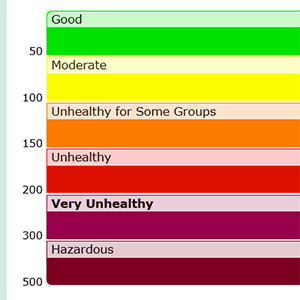
Air Quality Continues to be Impacted by Regional Wildfires

Joint Release
SPOKANE, Wash.-- Air quality continues to be impacted by regional wildfires and air pollution can intermittently be hazardous for all. Spokane Regional Health District (SRHD) and Spokane Regional Clean Air Agency (Spokane Clean Air) are urging residents to take precautions to protect their health.
Spokane Regional Clean Air Agency offers a current, regional air quality index at www.spokanecleanair.org/curren.... The values are updated hourly and put more weight on the most recent air pollution reading.
According to the air quality forecast, the current hazy skies and hot temperatures will last several days. Spokane will see a buildup of wildfire smoke (Particulate Matter 2.5 or PM2.5) and ozone over the next few days. While there could be periods of improvement, the forecasts for wind and fire activity indicate air quality will be in the "Unhealthy" range of the Air Quality Index (AQI) and possibly reach the "Hazardous" range at times on Tuesday and Wednesday.
Paying attention to these local air quality reports is one of the best steps people can take to protect their health. Both Spokane Clean Air and SRHD continue to issue news and health warnings about smoke, working closely with media partners and posting to social media. Pay attention to public health messages and take extra safety measures such as avoiding spending time outdoors.
"If you are told to stay indoors, stay indoors and keep your indoor air as clean as possible," says Dr. Bob Lutz, SRHD health officer. "Keep windows and doors closed unless it is very hot outside. Run an air conditioner if you have one, but keep the fresh-air intake closed and the filter clean to prevent outdoor smoke from getting inside. Seek shelter elsewhere if you do not have an air conditioner and it's too warm to stay inside with the windows closed."
Wildfire smoke is a mix of gases and fine particles from burning vegetation, building materials, and other substances. Wildfire smoke can make anyone sick. Even someone who is healthy can get sick if there is enough smoke in the air. Breathing in smoke can have immediate health effects, including:
- Coughing
- Wheezing and/or shortness of breath
- Asthma attacks
- Chest pain
- Stinging eyes
- Increased heartrate
- Scratchy throat
- Runny nose
- Irritated sinuses
- Headaches
- Tiredness
Populations at risk for acute respiratory problems from wildfire smoke include the elderly, people with compromised immune systems and existing lung diseases, as well as children, especially with exertion. Individuals should call their health care provider to talk about symptoms, or if symptoms worsen. Specific to asthma and other lung diseases, like chronic obstructive pulmonary disease (COPD), individuals should consult with their health care provider about medications and respiratory management plans.
Again, when air quality conditions deteriorate into "unhealthy" ranges, the best thing to do is to limit outdoor exposure. Spokane Clean Air and SRHD offer this guidance for education professionals and others hosting outdoor events: Guidance for Air Pollution and School Activities / Outdoor Sport Events
Do not rely on dust masks for protection. Paper "comfort" or "dust" masks commonly found at hardware stores trap large particles, such as sawdust. These masks will not protect lungs from smoke. An "N95" mask, properly worn, will offer some protection. These masks should be used mostly by people who have to go outdoors. If you decide to keep a mask on hand, see the Wildfire Smoke and Face Masks fact sheet from Washington State Department of Health.
###
Media contacts:
Spokane Regional Clean Air Agency: Stephanie May, 509-477-4727, ext. 125 SMay@spokanecleanair.org
Spokane Regional Health District: Kim Papich, 509-324-1539; kpapich@srhd.org
Washington State Department of Ecology (for air quality information outside of Spokane County): Brook Beeler, 509-329-3478; bbee461@ecy.wa.gov
More information:
Spokane Current Air Quality webpage Spokane Regional Health District wildfire FAQ
Washington State Department of Health Wildfire Smoke webpage
